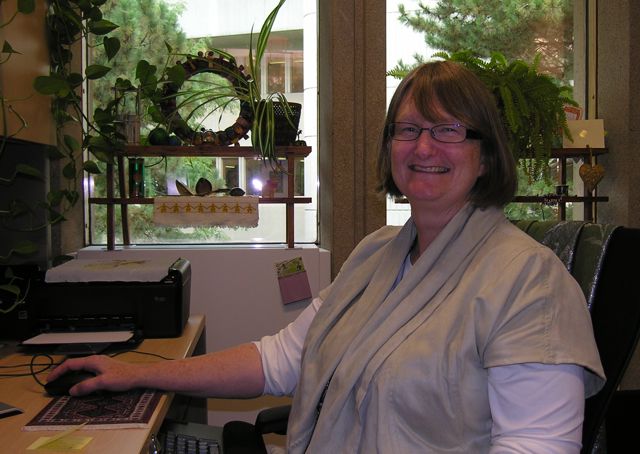Online Office Hours
Barbara Murck, Department of Geography, UTM
When Barb Murck, Senior Lecturer in the Department of Geography at UTM, was looking for the best ways to teach her online section of her large first-year course, she decided the best thing to do was to relax and put on a pair of bunny slippers – figuratively speaking.
“Bunny slippers” meetings is how Murck, a member of the UofT President’s Teaching Academy, and her students came to refer to the online chat sessions that served as virtual office hours for the 150 students enrolled in the Web Option section of her 900-student ENV100 course in 2010-11. Thinking about how to engage students has always been central to her teaching, but became much more central when she started teaching to a section that only met online. Wanting a way to humanize her online teaching, Murck started to joke that when the online lecture casts and chat sessions started, she told students to “get your bunny slippers on and curl up on the couch” – something that no one could do in class – and the name stuck as the year progressed. One student told Murck that she and her mother would indeed curl up on the couch every Friday night to watch ENV100 lectures together.
Although arranging regular chat sessions was especially important for online students, Murck has been offering online chat sessions in her first-year course for the past few years using the Collaboration Tools in Blackboard. At pre-arranged times during the term (the night before each quiz, and the week before a major test), Murck signs on for one or two hours in the evening and allows students to drop in and out to ask questions. Blackboard allows instructors to record transcripts of the chat sessions, so after each session ends, she copies it into a Word file and posts it in the same folder where information about tests is stored. This allows students who can’t “attend” the chat to catch up later.
“It’s really very simple”, she says, and even as someone who isn’t a technophile, it didn’t require much extra help for her to initially set it up. What makes the most sense is that the chat sessions are still a part of the course space, and students could sign on very easily. It also fits well into Murck’s schedule. She signs on at home, after dinner, and answers questions as students drop in and out of the session.
Challenges have been rare. The hardest part for Murck is keeping up with the students: “I find I’m typing madly. If I wasn’t a good typist it might be stressful. If I’m gone for too long they’ll wonder where I am and jump in. So I have to keep the pace going with short sentences.”
Another advantage? Students are active in the discussion and will self-police themselves if someone interrupts a question. Murck will even invite students to help her out with an answer to questions she doesn’t have on the tip of her tongue, by asking someone to look it up in the textbook and report back to the group. She says it rarely goes awry.
In terms of improving her interactions with her class, it has been overwhelmingly positive. Her students often tell her they wish all their courses had chat sessions. The “bunny slippers” chats have now become something that supplements the rest of her course interactions, rather than replacing them. While some chats are busier than others (from as few as a dozen students to as many as 80) there are always students signing on. “You don’t have to hang around at work and wonder if they’re going to show up.”
Murck still maintains office hours as an “open door policy” and talks with students in person after class, but the informal opportunity to chat is what makes it attractive for everyone involved. She can make a joke about her dog walking into the room while discussing the missing carbon sink hypothesis and carbon sequestration. She feels these personal touches come with the advantage of the anonymity in the chat setting, and her students like connecting with their peers as well.
Will Murck make any changes this year? She’ll add a new feature with her co-lecturer, Monika Havelka. The two plan to invite “questions of the week” from the class, and record their answers with a lecture capture. She’ll also assign some chat sessions to her Teaching Assistant instead of office hours. “We’re thinking of moving all the TA office hour online, since anyone can come, even if they’re at work or off campus.”
For any faculty thinking of trying out an online session like “bunny slippers”, Murck says to just go for it. “It’s such an easy thing,” she enthuses. “It’s a very easy way to make students feel like you are going the distance for them.”
